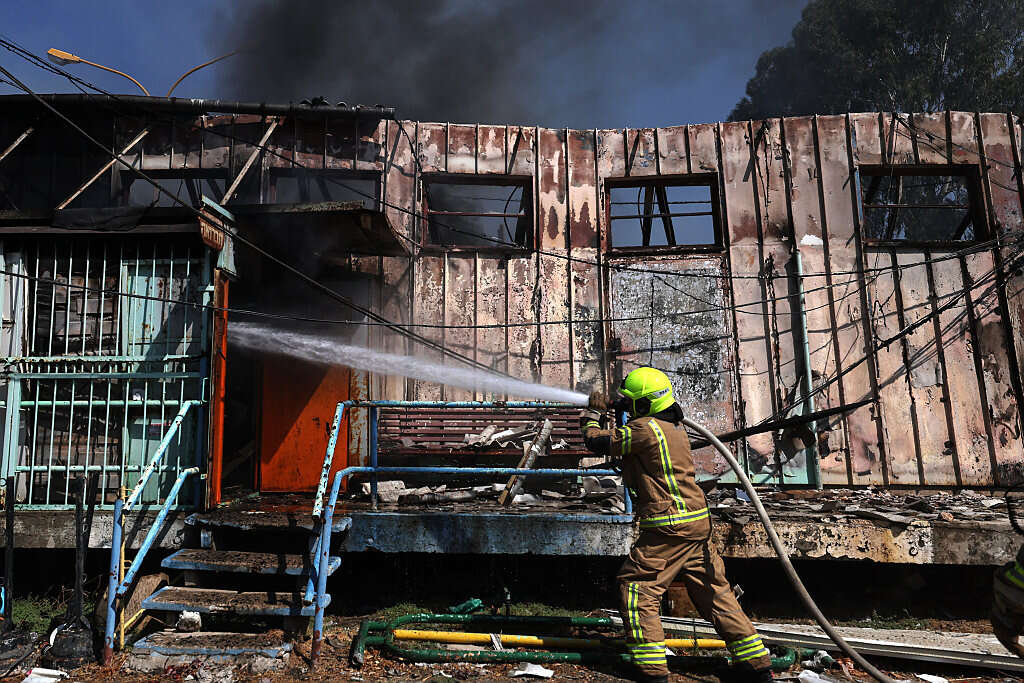The bustling city of Kiryat Shmona, home to 22,492 Israelis, has been reduced to a desolate ghost town. Time stands still in this northern city, just less than 1.5 miles from the Lebanese border, where most residents have been evacuated since October 8, 2023. Shops are shuttered, grocery stores emptied, and the parks and synagogues – once full of life – now stand abandoned. Driving through the empty streets, with constant booms overhead, shattered windows, and charred buildings, are stark reminders of Hezbollah's relentless rocket fire. The terror group has launched over 13,000 projectiles into Israel, too many to count, according to police. Over 60,000 Israelis have been uprooted and forced to live as refugees in their own country, with children displaced from schools and businesses lost.
We travel through Kiryat Shmona in armored vehicles, with just 15 seconds to take cover if rockets strike. Even during our journey to the city, we had to pull over as the Iron Dome intercepted incoming fire. While my team and I are visitors from Tel Aviv, this is the harsh daily reality for the fewer than 3,000 residents who chose to remain.
"Nobody can force us out of here," David Strul, who manages a moving company called Super Hovalot said. He spoke to us while checking on a friend's apartment, damaged by a nearby rocket. Shattered windows and scattered lead pellets, designed for maximum destruction, littered the ground. David's family has evacuated to Netanya, and he sees them on weekends but stays during the week to continue his business. "It's important to help my friends and community during this time," he said. When I asked David if he was afraid, he replied, "Of course, I'm a little scared. When there's a siren, I stay in my safe room, but it's stressful."

His voice cracked as he added, "It's hard seeing so many people displaced. Kiryat Shmona is a small place, we're all family here. No one will succeed in driving us out." David's resolve is unwavering: "We are a Jewish nation. We fear nothing, and with God's help, we will return to our homes stronger and bring back peaceful times."
Civilians are not the only people who have chosen to stay; Israeli police officers have made it their duty to maintain a presence in the northern communities so that they can respond to Hezbollah impacts and defend the civilians in case of an invasion from Radwan forces. "We will not bow to terrorism," Dean Elsdunne, the police spokesperson for international media said. "We are not just going to let a terror organization sit right on top of our heads and threaten us with these volleys of rockets and threaten to do October 7-style massacres in the northern towns of Israel. We need to stand, and we need to defend, and that is what we are going to do."
Dean's colleague, Yosef Tzemach, was working in the north as a police crime investigator but ever since October 7, he has shifted his role completely and his uniform now includes a bulletproof vest, armor, and a rifle, as his job now is to protect the civilians in the northern communities. "Unfortunately I had to deal with three dead bodies recently who died from Hezbollah anti-tank missiles," Yosef said, "and we need to make sure that the bodies can be retrieved and identified."
The situation is challenging for Yosef because the last time he had to identify a body killed by a Hezbollah anti-tank missile, it was his brother Oz Tzemach, who Hezbollah killed during the final days of the Second Lebanon War. Oz Tzemach was a tank commander and tried to rescue his fellow soldiers under Hezbollah fire in broad daylight before they were killed.
In the face of constant danger and devastation, the resilience of Kiryat Shmona's remaining residents and first responders reflects the indomitable spirit of Israel's northern communities. While the town bears the scars of war and its people endure unimaginable hardships, their determination to protect their homes and way of life stands strong. I can't wait to see this city brought back to life again.




